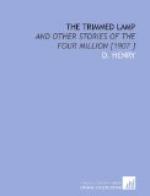Hanging conspicuously to the gas jet by a string was a folded paper. John seized it. It was a note from his wife running thus:
“Dear John: I just had a telegram saying mother is very sick.
I am going to take the 4.30 train. Brother Sam is going to meet
me at the depot there. There is cold mutton in the ice box. I
hope it isn’t her quinzy again. Pay the milkman 50 cents. She
had it bad last spring. Don’t forget to write to the company
about the gas meter, and your good socks are in the top drawer.
I will write to-morrow.
Hastily, Katy.”
Never during their two years of matrimony had he and Katy been separated for a night. John read the note over and over in a dumbfounded way. Here was a break in a routine that had never varied, and it left him dazed.
There on the back of a chair hung, pathetically empty and formless, the red wrapper with black dots that she always wore while getting the meals. Her week-day clothes had been tossed here and there in her haste. A little paper bag of her favorite butter-scotch lay with its string yet unwound. A daily paper sprawled on the floor, gaping rectangularly where a railroad time-table had been clipped from it. Everything in the room spoke of a loss, of an essence gone, of its soul and life departed. John Perkins stood among the dead remains with a queer feeling of desolation in his heart.
He began to set the rooms tidy as well as he could. When he touched her clothes a thrill of something like terror went through him. He had never thought what existence would be without Katy. She had become so thoroughly annealed into his life that she was like the air he breathed—necessary but scarcely noticed. Now, without warning, she was gone, vanished, as completely absent as if she had never existed. Of course it would be only for a few days, or at most a week or two, but it seemed to him as if the very hand of death had pointed a finger at his secure and uneventful home.
John dragged the cold mutton from the ice-box, made coffee and sat down to a lonely meal face to face with the strawberry marmalade’s shameless certificate of purity. Bright among withdrawn blessings now appeared to him the ghosts of pot roasts and the salad with tan polish dressing. His home was dismantled. A quinzied mother-in-law had knocked his lares and penates sky-high. After his solitary meal John sat at a front window.
He did not care to smoke. Outside the city roared to him to come join in its dance of folly and pleasure. The night was his. He might go forth unquestioned and thrum the strings of jollity as free as any gay bachelor there. He might carouse and wander and have his fling until dawn if he liked; and there would be no wrathful Katy waiting for him, bearing the chalice that held the dregs of his joy. He might play pool at McCloskey’s with his roistering friends until Aurora dimmed the electric bulbs if he chose. The hymeneal strings that had curbed him always when the Frogmore flats had palled upon him were loosened. Katy was gone.




